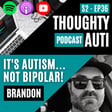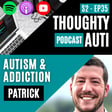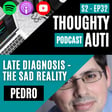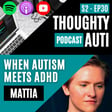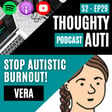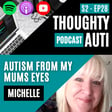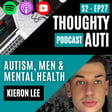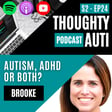Introduction to The 40 Auti Podcast
00:00:07
Speaker
Good day, my lovely listeners. You are listening to The 40 Auti Podcast. Tune in every week to explore inspiring stories and insightful information that dive headfirst into the world of autism and mental health. With all those tantalizing tongue twisters out of the way, let's get into the show.
Meet the Chronic Couple: Matt and Brandy
00:00:42
Speaker
Hello everybody and welcome back to the 4080 podcast. Thank you for tuning in for another episode. I think we're at episode 10 now. So we're in double digits and I am so happy to have you back here listening to me and my wonderful guests, which I'm not being mistaken. We do have two guests on today. A very, you know, a very new thing on the podcast.
00:01:10
Speaker
I am joined by the chronic couple, Matt and Brandy. Hey Thomas. Hi. How are you doing?
00:01:18
Speaker
Doing good. Yeah, we're doing pretty great today. Yeah, excited to do this podcast with you. Yeah. Have you been looking forward to this? Because I know that we're going to be talking about something that I don't have a lot of knowledge on. So it's going to be interesting for me as well to listen to what you guys have to say. And what is the topic of today? What are you coming here to say?
Autism and EDS Connection
00:01:44
Speaker
I think that the message that we both
00:01:47
Speaker
really want to spread is that the connection between autism and Ehlers-Danlos syndrome, it's a connection that isn't spoken about a lot. Ehlers-Danlos syndrome is something that is extremely painful. It's a lot of widespread symptoms and it's really hard for people to get diagnosed with this. A lot of people end up getting diagnosed way later in life. And so we've gone through this whole process of
00:02:17
Speaker
you know finding out what's going on with us why do we feel this way and then over time realizing that we both had the same thing which is it's an extremely rare connective tissue disorder and then going more into it finding out through being more open about being autistic that a lot of autistic people
00:02:38
Speaker
have a lot of the same symptoms and have contacted us and said, you know, wait a minute, but that sounds like me. So we just want to get that out there because medical professionals don't tell you about it. It's severely under research. Yeah. There's not enough research out there and a lot of the information out there is for kids and things like that. So we're wanting to really just help bring more education to things and bring more light to
00:03:06
Speaker
It's more than, you know, you're more than just one thing, you know, you're more than just having autism or whatever, there's more to life, you know, there's more going on with people.
Impact of Careers on Health
00:03:18
Speaker
Yeah, and I think one of the things that is difficult about autism is that it tends to come with, I mean, the medical term for it is a lot of, it's comorbidity, which sounds like,
00:03:34
Speaker
It sounds like a very strange word, but it basically just means that something is linked to it. Mental health. One thing that you're coming to talk about today, which is EDS. I didn't really know much about it until
00:03:55
Speaker
I sort of read over your profile. But anyway, do you want to give everybody a little bit of an introduction into who you are and what you do outside of your work and your podcasts and stuff?
00:04:10
Speaker
Yeah, you want to go first? Yeah, sure. Well, for me, I was actually more of the supportive role in all of this. Brandy did a lot of the research into the chronic illnesses, and we'll go into more of that later. But for me, I've been working a standard nine to five job and working from home and supporting my wife.
00:04:36
Speaker
during that process just learned so much about ourselves and the chronic illness stuff is what we both have been focused on for years. But what I do for work is more just I work at home just doing IT work and it's all just
00:04:57
Speaker
I mean, it's all emails and phone calls and computer stuff. So yeah. Very cool. What about you, Brande? So I am a professional senior. I was a background studio vocalist for a while and that was a lot of fun. It was in studio, so I didn't have to deal with crowds. But it's something that I've always loved music and had sort of a feeling that it was something that I needed to be doing.
Brandy's Health Journey
00:05:24
Speaker
So I had a lot of
00:05:27
Speaker
A lot of opportunities that started to come and arise and a lot of my career started picking up momentum and the schedule of that. I was in two different bands. I was working for a label back in Atlanta doing background vocals on other people's albums. We were doing the bar scene and it just really started taking a toll on me physically.
00:05:49
Speaker
to the point where I had to, I had to just stop my body to just shut down. And I was bedridden for a while. Um, and I just was like, wait a minute, you know, I've always kind of had these health problems and had a lot of problems when I was a kid, but you know, I've been able to manage and push through. And, and so my, my career, um, really sort of aggravated that and made it worse because I suffer a lot with anxiety. So.
00:06:14
Speaker
Um, being a singer was really tough because I loved being on stage, but I didn't like what came with it. So, um, so yeah, that was, that was tough. And having my body just sort of break down forced us to be at this point where we were, I was just kind of like, what is happening? What is going on with me? And nobody knew what was going on. No doctor knew no one. And, um, and it was just such a lonely, scared place to be. And, um, and so, yeah, it's, it's something that, that made me sort of want to,
Autism in Relationships
00:06:44
Speaker
get this message out more. This is something that is considered rare, like a rare disease, but in actuality, there's a lot of debate whether or not it's not that rare. It's just completely underdiagnosed because the symptoms are so vast that people just can't pinpoint that's what it is.
00:07:03
Speaker
It's actually sometimes hard to even pinpoint it until later in life. I got to correct myself. I am autistic. I don't have autism. Syntax is so bad.
00:07:19
Speaker
You don't have to worry about weds, yeah. But the thing is, it's kind of funny with our autism because her strengths are my weaknesses and my strengths are her weaknesses. So there's so much where it's like linguistically, I'm not saying that right. She's able to just help refine what I'm trying to say.
00:07:43
Speaker
Yeah, so often, like you saying like you like, Oh, I'm just an IT engineer. He's playing it or I'm just into it. He's playing it down. He's like one of the top IT engineers. And he's like an international IT engineer. I mean, it's just like, he's like, Oh, I do it work from home.
00:07:58
Speaker
Yeah, because it's hard to explain. I go into the detail. I want to be like, well, I connect to all these TV companies and I connect to their servers. He's in charge of entire countries. He just does little IOT work.
00:08:15
Speaker
I mean, it's not like I'm resisting. Can you get me in contact with some of the TV companies? Liberty Global, I think you might know that one. Speaking of that whole identifying thing, that was something we had to kind of learn before. We had always been like, when we found out we were both autistic, it was like,
00:08:36
Speaker
oh, you know, I have autism or all of that. And then to go through social media and see these other autistic individuals saying, you know, that you want to do identity first language and say, I am autistic and I have autism. That was something that
00:08:52
Speaker
you know, like we're still kind of working on, we kind of slip up a little bit. Me more than her. I think in terms of like social media, there is a large emphasis on those kind of things. And I do understand it. And I think, personally, I do say I'm autistic, because, you know, it's it's me, it's a part of me, it's not like,
00:09:19
Speaker
I have a disease and I'm, you know, like, bedridden from it and stuff. It's, it is me. But at the same time, like, I'm, I'm one of those people, I'm not really too fussed. Like, either way, if that makes sense. I know with social media, people tend to be quite reactive, opinionated about that kind of thing. Yeah.
00:09:50
Speaker
Yeah. Cause I mean, we're kind of like you, like, I mean, whatever you want to, however you choose to identify that is completely up to you. And it's cool with me. It's cool, man. Your choice. I mean, but just to add to that point, I remember the first, one of the first posts I ever did about autism and the connection between EDS. Um, it was very, very new. And so I wasn't using the proper, you know, language and, and, um, and somebody just came for me.
00:10:16
Speaker
No, they wanted to do. She got a little stalked there for me. I ended up deleting it. I was like, oh, wait a minute. I need to like research things a little more before I start posting things. I don't want to offend anyone.
00:10:28
Speaker
She spends days sometimes working on a post to get it just right. Just so that you don't trigger anybody. Not only that, but also she'll give me a post and I'll be like, it means this. And she's like, no, I don't even know how you came up with that. What does this mean to you? Do you understand what I'm trying to say here? It's like 90% of the time, nope, I don't get it. And then she has to, yeah, it's a whole process, but it's great. I feel like
00:10:57
Speaker
We have some perspective with the chronic illness stuff but also being an autistic couple.
Matt and Brandy's Love Story
00:11:02
Speaker
You don't see a lot of autistic couples either. No, you are the first autistic couple that I've come across on Instagram. It's nice to have
00:11:16
Speaker
have something different and I feel like a lot of the autistic influencers. I know we've talked about this word influencer before, but it is nice to have a couple. Can I ask how long have you guys been together? Seven years. Seven years, yeah. Been a while. That's so crazy. How's that going? She hasn't kicked me out yet.
00:11:44
Speaker
We dated for a year and we actually met each other through Match.com. It's like a dating site. I remember at the time, it was still not 100% mainstream. I remember getting a little bit of flack for it like, oh, you're just going to meet weirdos on there. You need to get out and meet people in real life. And now it's just commonplace.
00:12:11
Speaker
opposite like oh you met someone in real life because everyone meets on these apps and so on we were kind of ahead of the curve there but it was it was perfect because I you know just wanted to meet someone similar to me and I wasn't about the bar scene and going out and that's fine if you are but it just didn't work for me and so it was cool yeah we like to have an idea of like who who the person is before right exactly yeah get engaging with them exactly yeah and it was kind of insane because we had both been on three
00:12:41
Speaker
some horrific dates. And when we met each other, it was just almost like, Oh my gosh, you know, you're just like me. And we both had no idea we were autistic, but we both knew that we had these chronic illness conditions that the other one understood. And that was really cool because some people will use that against you.
00:13:03
Speaker
because they can't handle it. So we just clicked immediately and we kind of start just started hanging out like right away every day. It's interesting though when we first met.
00:13:15
Speaker
I don't think it was the first date, but it was pretty early on. We have these like party tricks that you can do with... Oh, right with the double jointness. Yeah. Yeah. We can both like put our feet like completely backwards almost and stuff and... Yeah. Pop things at a point. I mean, I thought it was... It was great for me when I was like, you know, younger because I love to dance and, you know, things like that and cheerleading and all of that. And so it was fantastic, but it, you know, as you're older, it's not so great.
00:13:45
Speaker
Yeah. She was always able to do like ballerina and chat the cheerleading stuff and no problem. And then I always wondered why the teachers would always be like, you know, you're so talented or something. And it'd be like, well, I'm really not. I'm just doing the same thing everyone else is doing. But I was doing it like, you know, a little bit more.
00:14:05
Speaker
flexible with a little bit more flexibility. And so, yeah, it makes so much sense. Now, looking back, I'm like, Okay, yeah, that makes a lot of sense. You know, because, yeah, I was able to just do a lot of things easily without having to, you know, go through like a stretch regimen to get yourself flexible. She just woke up that way. Yeah. Yeah.
00:14:29
Speaker
It's the thing that popped into my mind because recently I've just been... Have you watched Black Mirror? No! We've heard about it. There's an episode on there called Hang The DJ and your story of going through bad dates and then meeting each other and just being like...
00:14:50
Speaker
Thank God. It reminded me of that episode so you've got to watch it just to know what I mean. It was. We were just like, oh my gosh. It was almost like someone as weird as I am. I mean, I went really weird on the first day. I really thought I was scaring her off at one point, but it didn't.
00:15:08
Speaker
But this is a funny thing. On what, our third date? Yeah. He was so nervous and had gotten in his mind. She asked me out and I just, I, yeah. Well, no, on the third day I, I did. He had mentioned, he had asked me out, but obviously like I had mentioned, um, he had mentioned a movie he wanted to see like Avengers or something. And so I'm like, you know what? I'm going to send this dude a text and I'm going to like ask him to go see the movie. And you know, cause
00:15:32
Speaker
screw the patriarchy, like the guy has to do it first, whatever. And so he just got super nervous. And even though it was obvious that I'm the one that initiated the date, he said something at the beginning where he felt like I didn't understand. And then he started looping that I didn't actually like him. And he sort of flipped out and like
00:15:57
Speaker
like not in front of me, but he just like ghosted me for like the whole weekend. Yeah. No, at the end of the day, I'm like, well, it's pumpkin time and it was like 10 o'clock at night. I was so embarrassed.
00:16:13
Speaker
But the thing is, with him, with me, I found the awkwardness adorable. I liked it. And so when these guys, I would go out with them and they were all like Rico Suave, sort of like, you know, these, you know, what's up, baby? Yes, exactly. These types. I mean, that just made me want to barf. Somebody who is into like, you know, comics and like fun.
00:16:38
Speaker
obscure topics and sci-fi and so his awkwardness I felt was just something that made him even more attractive but luckily by that Monday he came to his senses and he just took me forever. What did he say he did like the whole weekend? He just like looped over it. Just looped and played video games and just I honestly thought I kept on thinking okay today I'll message her or text her or call her and I just I would start to text something and it would just be like
00:17:06
Speaker
No, but no, I can't I just I kept fizzling myself out It really almost cost us our relationship if I didn't call you back. Yeah, I had gotten to the point where I was like, okay I like that he's weird. But if he doesn't call me by Monday, he's gonna be a little too like too Timid yeah and shy for me and that's not gonna work. And so yeah, cuz I'm a lot I
00:17:35
Speaker
I was like, a lot of personality. Actually, when he called me that Monday, it was like we talked for like four hours on the phone. Oh, both our phones died. We put them on chargers and the whole thing. It was great. Yeah. It ended up working out.
Misconceptions About Autism
00:17:53
Speaker
To go into another really crazy story that a lot of people don't realize, it's like
00:17:58
Speaker
Um, the, uh, the view that, that people have sometimes of autistic people, I mean, I've been told, Oh, you're a singer. You can speak like you're not autistic or you're, you know, a little autistic or something. And it's like, no, that's not the case. We, you know, it's just a neuro type. It's the way that our brains are made. And we can do anything that you can do if we want to do it bad enough for the most part. I mean, we, um,
00:18:23
Speaker
something that happened with our wedding is we had kind of a crazy thing. I've always loved this show here called Say Us To The Dress and it's on TLC. Yeah, I've seen that. Yeah. They kind of show you picking out your dress and everything and some people, they get their weddings filmed and so on a whim, I just decided to send in an email.
00:18:50
Speaker
Because you get 20% off your dress. So we ended up getting chosen. So our wedding was on TLC. And that was kind of cool. It was insane. And then we ended up getting a phone call from CNN. Yeah, CNN. Their morning show. Their morning show.
00:19:10
Speaker
because of our wedding date is 11, 12, 13. Numbers guy. Yeah. Two seconds after proposing, I'm like, so I was thinking about the wedding date. It's not going to come around for another century, so let's do that. She was cool with it. It was on a Tuesday of all things, so it really made it weird for a wedding.
00:19:33
Speaker
We had to do the numbers. Yeah, so we got an interview We got interviewed on CNN about why we chose that date and yeah being on santa dress and all of that So that was kind of interesting. It's like yeah, you know people cool autistic people we can be in the public eye and You know do anything, you know, yeah
00:19:53
Speaker
We just might need a day later to recover from it afterwards. I will say it was a lot. But it's something that was an interesting experience. Oh my gosh, yeah. It was a lot of fun.
Social Media and Chronic Illness Awareness
00:20:08
Speaker
So what sort of drove you to start your podcast and your Instagram stuff? Do you have any motive in mind or some goal that you want to achieve with it?
00:20:21
Speaker
Um, for me, uh, I'm the one that initially started, we both had our personal accounts and, you know, um, excuse me. Okay. I was the one who initially started, um, a chronic illness Instagram account. And that was based on.
00:20:45
Speaker
solely the the fact that I couldn't find enough information um of actual people with some of the symptoms that I had it was like I was googling and there was just all these like medical journal information this medical journal information and then like you know vague kind of things and um so I realized that if I search certain hashtags of my symptoms I was able to connect with people going through the same thing and that more than anything pieced together
00:21:14
Speaker
like every step. And, um, and so I thought, you know, I think I probably need to, to make my own account so that I can also help people and give them the information that has taken me almost 40 years to learn. And, um, and so then it, it sort of in the market. Yeah, it's just, it was kind of crazy because then about what three, four months ago, I started talking about autism and opening up about that.
00:21:41
Speaker
And then at that point, that's when it just sort of, you know, exploded a little bit because so many autistic people deal with chronic illness. I think, um, I'm sorry, go on that. Oh yeah. No, I was just going to say like that, her, her buildup of the chronic illness and the, just the chronic illness Instagram. And then when it's, when it flipped and, uh, I realized I had autism as well.
00:22:10
Speaker
Or I have, I'm autistic now. Oh my gosh. Say that again. You don't have to worry about it. It's fine. Oh, it's so bad. So bad though. If someone jokes down your throat for this, I will personally hunt them down. Okay. I appreciate it. Thank you. Because I keep on saying it wrong. No, I mean, you know, I guess there is no right or wrong to whatever you want to say.
00:22:32
Speaker
Yeah, I mean, anyways, being autistic and realizing it with her and all the activism she had just with the chronic illness when the autistic community really opened up to us, it was like, whoa, someone that actually gets my jokes or like people that actually
00:22:56
Speaker
Like similar things I think one of the weirdest ones for me throughout my whole life was I have this really weird cotton issue Specifically cotton balls when they're pulled apart it it it will Yeah, I'm already just even mentioning it to you in my mouth is dry. I'm wanting to jump out of this chair It's a whole thing and I I really just thought that was just the weirdest thing that I had my whole life everyone in my family
00:23:26
Speaker
thought it was just fun to terrorize me with it and I just didn't put it together. It's a legit thing and now I'm like, oh, okay, now I know why. It's a textural issue. Yeah, it's a big one. I have the same thing with pear skin. I can't stand pear, you know, like slightly ripe.
00:23:43
Speaker
like too overly ripe pear skin. It literally like sends shockwaves through my body of terror. Yes, yes. It probably bothers you just even saying it, I'm sure. Yeah, but I'm a bit stubborn with anything. So anything that I feel like I can't do, I try to overcome. So I used to just eat pears just dying inside, just trying to teach myself not to have that reaction.
00:24:13
Speaker
Oh, I so relate to that. Like I can tell you with my singing, I love to sing, but I have anxiety disorder. So I, I will force myself to do it. And so what ends up happening is I, I barf before every show, everybody knows bandmates, everything have a trash can backstage. Brandy's going to barf and then she'll be fine. And then I walk out on stage and I'm fine. But it's like, I'm not going to let that,
00:24:37
Speaker
anxiety take over and run my life. I'm going to try my best to overcome it. That's brilliant. And I think because my past was that I used to be an athlete. I used to compete in Taekwondo. Cool.
00:24:54
Speaker
And I used to go competing around the world and stuff. And I went to some quite major competitions competing for Great Britain.
Performance Anxiety and Mental Health
00:25:03
Speaker
And I always, without fail, had a panic attack before every single fight. So I understand that struggle. Like, it's horrible. It is. And then sometimes I remember once having one on stage and then having to bar up on stage.
00:25:21
Speaker
But I've had a water cup and I turned around and barf and then came back and finished the song was like, you know I'm not gonna let it stop me but it just definitely adds a layer of like Just like a pain in the butt, you know, yeah to what you're trying to accomplish That's really cool though. Yes. I'm not the only one that does that It is like it's it's very cathartic isn't it and you've got to kind of face that stuff and I think
00:25:51
Speaker
I think that there is a heavy influence from anxiety and stuff like that. I have a very close air quotation mark relationship with anxiety and depression. It plagues me. It's plagued me since I was about 14 years old and it's still continuing to affect me. And I think that there is quite a high rate of
00:26:19
Speaker
mental health co-morbidity as well with autism. Yeah and I'm still trying to figure out to what extent that is biological and what extent that is social because I did my degree in biomedical sciences and I decided to look into that quite a lot.
00:26:38
Speaker
And it does seem that there are genetic factors for that kind of thing, but then there is also... But how do you measure the social influence? How do you measure the impact of bullying and being isolated and alienated and all that? Exactly, right? So it's, yeah, it's difficult in that sense.
00:26:57
Speaker
It's that, it's, at that expression, I've heard something about genetics, load the gun, environment pulls the trigger. Yeah, definitely. I, I relate to that. Yeah, absolutely. Cause yeah, the environment being, um, autistic and chronically ill and not knowing that for your entire life is rough. Yeah. It's rough. Like we've both been like, you know, bullied and misunderstood and yeah.
Managing Anxiety with Meditation and Medication
00:27:24
Speaker
and exactly it's same depression, anxiety, the whole thing. Well, and the thing is too, you can be depressed or anxious about something that happened years ago and it will plague your mind for the days and you just can't break from it. I do think something that's helped both of us is meditation a little bit, but I mean, that's only going to help so far. I mean, I think there's
00:27:50
Speaker
Meditation and medication. Yeah, meditation and medication. Literally just thinking of that, you've read my minds. Meditation and medication. Yup. Yup. That's the combo. That is the combo that works. I might put that in the title for this podcast episode. Yeah, that works. Feel free. It's kind of on brand for us.
00:28:15
Speaker
It's funny though that this is a good point that you bring up the mental health aspect because so many women are underdiagnosed with autism because they are diagnosed with mental health issues instead. That's something that I dealt with. I was diagnosed with everything from bipolar, borderline personality,
00:28:38
Speaker
or borderline personality disorder. It was anxiety, depression. I mean, yeah, just it went on and on and on. And, um, and it wasn't until my therapist mentioned something about compare, she compared me to a client of hers that, um, was autistic and, and it put this little like bug in my, you know, like here, like, could that be? Yeah, you're just thinking about it, looking up and
00:29:05
Speaker
Yeah. And then it kind of snowballed from there, but I'd been in the mental health system for a long time. And no one even mentioned autism. And the second that I was diagnosed, my therapist was like, how did I miss it? How did I miss that? How did I not see that? Because so many women are underdiagnosed. I mean, the numbers, I think it's like four males to one female or something. I'm not sure if that's exactly correct. Those numbers are probably so wrong.
00:29:35
Speaker
Yeah, those numbers could be incorrect there because we also as females on the spectrum are able to mask. Even if we're the same cognitive level as a male, we can mask very, very well. And then our special interests seem to be
00:29:55
Speaker
more socially acceptable as women. It's not like trains and something that is very obviously, oh, you're autistic. That's a typical interest of a person that's autistic. No, but my special interests were makeup, hair, clothing, shoes.
00:30:13
Speaker
things that it's like, oh, you're just girly. But no, I wasn't just girly. I was obsessed. You know, but that's more socially acceptable. So it wasn't any sort of red flag. Were you the like sort of Hermione Granger type girl when you were younger then?
00:30:30
Speaker
Yeah. Yeah. I was. I was. I was definitely like I was definitely I was spitting out facts a lot and kind of I'm sure I was called to know it all. She would brag to me about like how she would study for something like the night before and taste the test the next day because she just like had that memory and skill and attention. Yeah. Yeah. This is something though that
00:30:58
Speaker
Um, that I just found out through my valuation, I have something called dyscalculia. Oh yeah. Yeah. Yeah. I was homeschooled. So, um, from all the way until my senior year. And, uh, yeah, I just, it's, it's funny because for me, I liked computers. I liked math and that was what I was good at. And no one really gave it a second thought or, or look, uh, about my behaviors, but.
00:31:26
Speaker
looking back on it now it's like it wasn't normal to spend whole weekends or months at home in front of the computer constantly I mean that probably was not a good healthy
00:31:39
Speaker
When did you read the DOS book cover to cover? My very first computer manual I read was 1,500 pages at the age of 12 and read the whole thing cover to cover about my DOS. That was my game. It was computers.
00:31:56
Speaker
I used to be a very big... You know, I liked gaming, but I think at that age it was more of like an escapism thing, like gaming and stuff. It was very heavily like something that I just wanted to zone out with. It was... I used to be in front of the computer a lot, like, because I didn't want to interact with people because people were horrible in my eyes at that age.
00:32:25
Speaker
And, uh, yeah, I'm guilty of that too, with the gaming, uh, as well. Actually, uh, in my twenties and thirties, I mean.
00:32:35
Speaker
Did you ever hear of World of Warcraft? Yeah, I know, World of Warcraft. I was a real estate person though. Oh, yeah. But you understand, you would play 40 hours a week in addition to whatever else you were doing in life, and it was just not healthy. I mean, there was so many years of my life I've wasted. And then he converted the video game addiction.
00:33:03
Speaker
made that a little less, but then he started playing games on his phone more. So it got to the point where he was just phone gaming, everything. It actually reached a point where we had to have a discussion about it. Always in your phone. He was running into people.
00:33:21
Speaker
That's when you know you have a problem. But it really helped understand myself a lot more after everything. You were stimming. Yeah, I was constantly stimming with video games. I think that's just like you were saying, it's like you get sucked into it, it's an escape and things like that. But when it comes to stimming, I'm very different than her. I don't have any like fidgets or like I have to move something all the time.
00:33:51
Speaker
Give me a video game. I'll play that until I've forgotten to eat and everything else. Go for days, go for days, drinking Pepsi, not realizing that it's got caffeine and not wanting to go to the toilet because you've got to level up.
00:34:08
Speaker
Oh yeah. Oh yeah. That is totally him. I would leave for band practice, which would be like four hours and I would come back and he hadn't moved. Has the dog been out? That would be an issue.
00:34:28
Speaker
So you've talked a little bit about your experience with autism, just like going through what life was like and stuff. Is there anything else that happened when you realized you were autistic? What happened to your life? Where did it take you?
00:34:49
Speaker
For me, it took me into really reflecting back on the rest of my life.
Self-Reflection and Autism Diagnosis
00:34:57
Speaker
I mean, 38 years of my life, feeling alone and not understood and just a lot of negative self-deprecating thoughts. And after understanding I was autistic and then also
00:35:14
Speaker
the comorbidity of having other stonemos and pots for me that a lot of events in my life where
00:35:25
Speaker
something didn't go like I wasn't able to like physically do something or like I couldn't properly communicate a few in a certain way. Yeah, it just it really has given me a lot of permission to like just forgive myself for messing up. And I think that really helped.
00:35:45
Speaker
to just have less internal strife and dialogue because I mean I could loop on something I messed up on years ago and it ruined my whole day if I let it. But having that knowledge of yourself and listening to other people's experiences helps with being easier on yourself because it's not just
00:36:10
Speaker
the problem isn't you. The problem is everybody else and how they work and how different you were at the time. I feel like that's how I felt when I was reflecting on things. Yeah. Totally agree.
00:36:27
Speaker
Yeah, it really is eye-opening, just looking back, looking for all the symptoms and looking through listening to people and backtracking to different parts of your life and just going, hey, you know what? Like, we had a bit of a misunderstanding here and, you know, I was different and they're different and we can go out separate ways and feel all right about it now. Yeah.
00:36:56
Speaker
I think there's a lot of that with getting a diagnosis. I feel like most people when they say, when you introduce or tell someone that they have some autistic traits, they take it as, well, why do I have to do that?
00:37:10
Speaker
It can be the people who have the most like jadedness and hatred towards people like just because of their past and they could see no reason for it just adding on to the problems that they have in their eyes, but it's not about lies. It's just understanding your life from a new angle that's true. I completely agree with that because coming from a person who
00:37:39
Speaker
basic like myself who basically just believed they were crazy. I mean, it's just like I had all these other labels placed on me that were incorrect. And so for me, the the label of autistic made me feel better. It was like, oh my gosh, like, this explains so much.
00:37:57
Speaker
This explains, like as a kid, I would have these meltdowns. I mean, just my mom said, you know, I would like hit my head against the wall and it would just be like all of these things where it would just be like, yeah, I guess I am crazy because only a crazy person would do that. I mean, and so when I was able to sort of put this label that I felt like fit on me, it made me feel so much better. It made me sort of feel like,
00:38:23
Speaker
I found my people now because there are other people out there just like me, other women out there that have gone through the same things. We talked about this on our first episode, but when I was a teenager, I had a meltdown that I ended up freaking out and trying to hurt myself. I ended up in a mental health facility for teens. If everyone had known I was autistic, they would have recognized that as a meltdown.
00:38:50
Speaker
and been able to probably, you know, deal with that a little bit better. And I just kept thinking, I can't, why can't I control my emotions? Why can't I control my thoughts? I'm just weak, you know, I'm just not as good as everyone else. And then you have society telling you that at the same time. And so for me, yeah.
00:39:13
Speaker
Oh yes. And instantly comparing yourself with everyone else and why can't I do what they can do. Yeah. But it was like my chronic illness diagnosis explained a lot of different things but it didn't explain everything. And it was like my mind was then hyper focusing on those things that it did not explain. And then when I
00:39:33
Speaker
got my official diagnosis of autism, it was like, yep, that explains everything that's left. And I could let this weight go of just like, that's why I did that because I don't like to have a lot of friends and I've gotten a lot of flack for that. And I just thought,
00:39:52
Speaker
You know, I guess I just didn't like having friends because there's something wrong with me. And then to see all these other people that are just like me, it was like this. Welcome to the team. The aliens among the human race. Yeah, exactly. It's like I felt like I belonged for the first time in my entire life. I mean, really. Same. Same. I mean, I think the autistic community really is awesome.
00:40:18
Speaker
because they actually understand our humor, our life stories. I mean, I'm sure what we're mentioning here on this podcast, there's other people that will be able to relate. I do. It was funny. It was funny too because my diagnosis came first and then
00:40:38
Speaker
As soon as they started talking to me about it, I was like, wait a minute. My husband does the same thing. I was like, Matt, you need to ask your therapist about this. What happened? Yeah. When I asked him, he was like, well, you handle things so well. I've never seen any kind of behavior from you that would hint towards that.
00:41:00
Speaker
going into like past childhood things. And I think the one that finally got him was when I was telling him I was getting chased.
00:41:09
Speaker
uh, by my younger siblings with a cotton ball and screaming in fear. And he's like, yep, that's a little spectrumy. It's like, okay, dude. That's where his Instagram name is from. Yeah, it really is. Cool. So, um, do you want to, um, give us, give us a little introduction into what EDS is and you know, what are the main sort of symptoms and how did it, how does that link into autism?
Understanding EDS and Comorbid Conditions
00:41:39
Speaker
Yes. Okay. So excuse me. So EDS is a connective tissue disorder and there are 13 subtypes of EDS. One of the more common ones is hypermobile and that's the one that Matt and I both have. The way that you would find out if you have EDS or not is to make an appointment with a geneticist.
00:42:03
Speaker
which a lot of times that's really hard to get a referral to because doctors want to dismiss your symptoms as something else or all in your head and they don't want to give you that referral, which was really, really tough to get. I think it took us almost a year and she had to get it from an allergy specialist. And it was after he had tried for six months of failed treatments with horrible side effects.
00:42:27
Speaker
And I just basically like was like, send me to a geneticist. So, um, because I know this is what's wrong with me. And, um, even though I had people telling me, Nope, you don't have a connective tissue disorder. Um, but I did. And some are a little bit more.
00:42:41
Speaker
aggressive as far as symptoms. Vascular EDS can actually shorten your lifespan. And so the geneticist, we asked him where like the type that we have, are we going to have a shorter lifespan? And he basically said, no, you'll live as long as everyone else, but it's just going to be a lot more painful for you. And I was just like, okay, well, I guess that's good. But you know, it's a connective tissue disorder and basically our
00:43:08
Speaker
our body produces faulty collagen. And since collagen is the main protein that, you know, builds the structure to your body and it's everywhere. It's in your joints, your skin, in your cells, your ligaments, yeah, cardiovascular, everything, because our collagen is faulty. All of our systems are pretty much affected. And then it causes weak, unstable joints, um, referring to dislocations, partial dislocations. Um,
00:43:34
Speaker
because it causes heart and digestive issues. A lot of people with EDS also have something called POTS, and that stands for Postural Orthostatic Tacticardia.
00:43:45
Speaker
And Matt has that. And another comorbid condition of EDS is mass cell activation syndrome. And I have that. So you must have a lot of allergies then. Yes. Just going back to my lectures at uni, because it's like some of the things that you're saying is like, I know that word. I wonder if it's that word.
00:44:09
Speaker
Yeah, she has a lot of allergy stuff. Yeah, there's bloody mass cells. They're so, they're really, I can curse here. I think they're really bad. It involves lots of cursing. And some people, unfortunately, in the EDS community have what's called the trifecta, and that's EDS pots and mass cell. And so we're lucky that, you know, we just got one of each, I guess, from that.
00:44:36
Speaker
But yeah if you if you want to visit the Ellers Standless Society website that gives a lot of information a lot of symptoms and basically you know you can you can kind of get more information about it. POTS and mast cell are are two things that
00:44:53
Speaker
that really, really suck. They add a lot of pain to your life in addition to Ehlers-Danlos. It's just so unrecognized by the medical community that it took me until I think 38 to get diagnosed with Ehlers-Danlos. That was even with at 15 going to some of the best specialists for my allergies, but they just
00:45:17
Speaker
You know, I had hives, chronic hives, um, a lot of anxiety. Um, they even described it correctly at the time. They were like, your body's allergic to itself is, is the simplistic way of they put it. Basically it's like they did describe what mast cell activation syndrome is, but they didn't have a name for it. Then it was basically, uh, I think maybe four or five years ago that they, they put a name for it and, um, and it causes like really strange reactions to food, mold, heat, chemicals.
00:45:45
Speaker
Um, basically chronic inflammatory systems, like you're allergic to everything. Um, but yeah. And then, and then pots like, yeah. And then the pots portion, um, uh, really it's a lot to do with blood pressure.
00:45:59
Speaker
And so if I stand up too quickly, I can faint and that's a long fall for me because I'm six foot four. I get that. My vision goes a bit blurry and I feel a bit dizzy. I think that's just postural hypertension as well because I'm quite tall as well. Compression socks help with that a little bit. And then also if you're not wearing compression socks,
00:46:23
Speaker
tensing up your your calves to force the blood to normalize really helps but the biggest thing is just when you're doing any of those kind of movements from like bending down or any kind of times where your head is below your chest and then you stand up too quickly and
00:46:46
Speaker
You just got to be careful or like put your feet on the wall straight up and that helps. Um, he, Matt was actually started this whole journey. Like, I mean, with the chronic illness thing, because
00:46:56
Speaker
I knew I had issues with allergies. I knew I was allergic to a lot of different foods and all of this, but that's just basically what I was told. I managed it. It was fine, but then one day we were at a concert. Oh, man. Yeah. Yeah. I ate too much food and I told Brandy that I did not feel good. I needed to find a restroom really quickly. She was dragging me along through a crowd and trying to help me.
00:47:27
Speaker
Uh, my hand slipped and when she turned around, she saw me falling headfirst into concrete. And that was woke up spitting out pieces of my teeth. Yeah, it was intense. Crazy. I thought he, I was not a lot of help because he basically was just like a tree that fell straight face first, arms to his side. And I just started screaming.
00:47:49
Speaker
And then everyone else, this little girl beside me, then she started screaming. And then paramedics came, luckily, because they were at a concert. So they were right there. But that started this whole, you know, like research into like, wait a minute, what do you have? And then once he got diagnosed with POTS, I got diagnosed with mast cell a few years later when I got to the point where I couldn't go outside without having these like physical reactions where I was allergic to
00:48:18
Speaker
basically like the air. I mean, it was just like chemicals in clothing, chemicals in target. I went to target once and I couldn't breathe. I mean, it was like so many chemicals because I was, my own mass cell wasn't being treated. It had gotten to that point where I needed medication and that I didn't have because I wasn't diagnosed. And so then we both got this diagnosis and through Instagram,
00:48:42
Speaker
through chronic illness, I started realizing this pattern that people with these conditions also had this thing called Ehlers-Danlos syndrome. And then of course we googled that and it was like, that's us. I mean, 100%. And then the job started of convincing a doctor. It's so annoying that you have to do the work, isn't it? It's painful. It's painfully annoying because it's like,
00:49:10
Speaker
you have to do the work for it but you also have to convince the doctor that they're not seeing something that they're supposed to be seeing and that annoys them and then you just get in some annoying little sort of situation where you keep going to like tell them and they're like nope you go back and you're like nope and then they give up and then they do it and they're like
00:49:31
Speaker
Yeah, you know what, you were right. Yes, I definitely got that right. Right, right. Exactly. They keep on going like, well, you know, it could have been this too. And, you know, they try to make themselves feel better or whatever. So many doctors, I want to just take my diagnosis and shove it in her face. Be like, Oh, really? I told you so.
00:49:53
Speaker
Oh, it's like, yeah. And that was a long road getting that geneticist can take years to get into. Luckily we got in six months, which was a little less, but, um, yeah. And then, and then once we started talking about autism,
00:50:09
Speaker
I started finding these other accounts of way too many, because we noticed patterns. I started pattern noticing all of these autistic accounts with Ellers Dunlos. Then I went down that rabbit hole of research and it was a very under-researched subject.
00:50:31
Speaker
Um, that is a comorbid condition for a lot of people who, who are autistic. And it's like, man, why don't people, why did no one ever, and I wasn't just going to like, you know, this like, you know, random doctor, I was like the best specialists and, um, no one mentioned it.
00:50:51
Speaker
Yeah, it's crazy. Then you hear the best of the best and they're like, oh, it's going to be thousands up front and it's a multi-year waiting list or things like that. It's just insane. Even now, the view of autism is so misconstrued. I have a specialist that I go to for my mast cell.
00:51:13
Speaker
Uh, syndrome. And when I'm, he's like, Oh, anything new going on? And I'm like, yeah, um, I actually was diagnosed with autism. And so I, you know, found that out. And, um, he was just like, he kind of sort of looked at me like perplexed and was, yeah. And he was like, but you're really high functioning.
00:51:34
Speaker
And then it's like, really? I mean, I guess I appear that way on the outside, but you have no idea what I've been through. I mean, you know, you have no idea the meltdowns that, you know, things that have happened to me, like, I may appear high functioning, and I may be a lot more functioning than a lot of other people. But, you know, just to be dismissed like that, like he almost didn't even believe me.
00:51:58
Speaker
like oh you're just a little autistic yeah it's like it's like people assume that everybody puts in the same amount of work as well like to try and get get over things because you can have it's like you can you can be
00:52:14
Speaker
really, really, really bad at socializing. And then you have to put in a lot of work to get to like a normal sort of level, just as like a little fall experiment. But then like, if you could put in like a massive amount of effort and get really good at socializing, but you could initially be really bad at it. And people only see the the peak of that, don't they? Mm hmm. Absolutely. Yeah.
00:52:37
Speaker
they don't understand all the behind the scenes thing. It's like they feel like they can tell you that. Right. Yup. Even though they're not you. Yeah, exactly. And you know, it's so funny the way that my doctor speaks and talks. I was looking right at him and I'm like, I wanted to be like, and I think you're on the spectrum too.
00:53:00
Speaker
I could see it. I could just see it the way he spoke. Do a little of a double click. I was like, he didn't make eye contact with me. Anything. I wanted to be like, you might want to check yourself there.
00:53:12
Speaker
Yeah. I didn't say that though. No, no. We all want to. People that usually don't respond well to that. I don't know why. Well, I mean, I do know why, but they shouldn't. But it's like, it's almost like from this side of the fence, it's like, it's like, I don't know why. I mean, it's not, you know, it's like, it's been such a- Come join me. Yes. It's like, you have no idea what internal struggle you're having because you're not willing to explore this part of yourself, you know? It's huge. Yeah.
00:53:42
Speaker
So what are the most common difficulties that you find that are associated with EDS? The things that you try to avoid or problems that cause a lot of difficulties in your life, even like now?
00:54:00
Speaker
I can tell you, chronic pain is the biggest one. Absolutely. I read an article where a doctor actually, this sounds extreme, but a doctor actually can compare the pain that a lot of people with EDS have to the same pain as cancer patients. Because for certain times, when you have a flare, it's like, for instance, I've been in a flare for, what do you say, two weeks?
00:54:30
Speaker
Yeah, almost a month now. Almost a month, really. But for the past two weeks, it's really been bad where I can't really walk. And so I have a wheelchair that I use for those instances. And I have like two canes that I can use. And because your joints are so loose, and it's almost like the way someone explained it, it's like you're walking, but for you, walking
00:54:57
Speaker
Five feet is gonna be like running five miles for the average person because your muscles are working so hard to hold your body together because you're
00:55:06
Speaker
your connective tissue isn't doing it for you, then you get tired very easily. I've had constant dislocations. I can pop my shoulders in and out. I've constantly had sprained issues as far as sprained ankles. I've lost count. For women especially, men can be affected just as much as women, but for some reason, women tend to be affected a little bit more because of our hormone imbalances as far as
00:55:36
Speaker
what we go through every month and so because we're already a little bit more flexible because we have kids so when we have these hormone surges it makes us extra flexible and so then you walk and you feel like your knees are gonna buckle underneath you or something and this is something I was able to kind of
00:55:57
Speaker
pushed through for most of my life, but now that I'm 39 and I'm going to be 40 in August and it's like, um, I notice a lot of people with EDS around my age. It's like, it's almost like when your body starts kind of falling apart a little bit and, um,
00:56:13
Speaker
It does make sense that women would be more regularly affected by it because I know that testosterone, which is obviously higher in guys, has a tendency to thicken connective tissue and has a tendency to cause hypertrophy, which is increasing muscle size and strength.
00:56:37
Speaker
stuff. So that I can imagine that that would affect your joints as well. So like, imagine it in a good way. Right. Exactly. Well, yeah, that's, that's what's funny about it is like, um, we know when it's a bad pain day for her, because I'll also be in
Weather Impact on Chronic Pain
00:56:55
Speaker
pain. Um, when the weather changes, like when it's about to rain or, uh, if the temperature like sharply drops down really cold,
00:57:04
Speaker
I'll wake up and be like, okay, for me, it's mostly my just major joints like knees and elbows and ankles.
00:57:14
Speaker
For women, it's like everywhere. Yeah, for her. I'm like, what hurts? She's like everything. The geneticist, I got diagnosed first. And then he, of course, sent me to all these specialists in physical therapy, orthotics, and all this stuff. And then when he got diagnosed, he was like, do I need to go to any of those places? And he was like, no.
00:57:42
Speaker
He said the same thing you just said, that the testosterone makes his connective tissue more dense. And yeah, so it holds him in a little bit better. And then I'm over here just all over the place, but it's kind of a... Do you know what I was thinking about? Do you know those like...
00:58:01
Speaker
those sort of wooden string structures that you can get where it's on a platform and then you can push a button and the string relaxes and the structure just falls down. And you can press it again and then you're like... That's it! That is totally it. She just falls apart for a little bit more than me, that's all.
00:58:24
Speaker
It was really scary because I had to stop singing for a while and for a few years just to kind of get this all straightened out and I have a YouTube channel and so someone found a local band here. We live in Asheville, North Carolina. They saw me singing and they asked me if I wanted to join and I cried at first because I was like, I would love to join this
Return to Music and Representation
00:58:47
Speaker
band because I would be one of three singers. So
00:58:51
Speaker
in the past, you know, I was the only singer. So it was like four hour sets, you know, just a lot of pain. And, and so I cried because I just really wanted to do it. And then I thought to myself, you know, I'm on the right meds, I've, I have braces that I can use. I have back braces and
00:59:09
Speaker
you know, braces for every joint. And I'm like, maybe they'll be okay with that. And so I asked them about it and it was just very upfront about like, listen, I may have to be in a wheelchair sometimes or have a cane on stage. Is that okay? And they were cool with it. And so that's not only that, but she found out a, a bandmate, uh, his husband, his wife, his wife has connective tissue disorder. Yeah. I think there's different ones. There's like, uh,
00:59:39
Speaker
Hypermobile syndrome, I think is one, or hypermobile joint syndrome is one of them. And then, and then EDS and then the different subtypes. But, but yeah, so he completely understood. And I was just so scared because sometimes in the workplace, you know, uh, like in the past, I've been fired from jobs because I called in sick too much, or I wasn't able to do this or that. And so I wasn't sure if they'd be like, no, you know, that's not going to be okay on stage. But it was, it was really cool because
01:00:08
Speaker
Yeah, they were okay with it. And I think that more disabled performers need to be seen because we're out there too. This doesn't affect my voice. So I can still sing. So that was cool. But yeah, it's been kind of scary because as I'm older, it's sort of affecting me more. For instance, last week I had to cancel band rehearsal because I was in so much pain. It snowed here.
01:00:35
Speaker
that caused like this, this pain flare to go nuts. And so it's just really tough. Like with EDS, the biggest thing I guess I could say is like waking up every morning and you just don't know if you're going to be able to walk or you don't know if you're going to be able to eat. I mean, it's just like you kind of crack your eye open. Like, what's it going to be today? Yeah. Every so often you get a day where you're like, it's a low pain day, you feel good. And then on that day you just want to do everything.
01:01:03
Speaker
It's like, you know, let's go everywhere. And then you ultimately end up overdoing it and paying for it. But it's like. Well, and that's the thing I think she's had to figure out the most is when she's in those bad pain days, learning to not really be as active and bed rest actually helps her a lot to recover. And it's kind of good that we're both on the same level because of like pain, daily pain, because we would be in trouble if we were both like
01:01:33
Speaker
You know, like having issues with walking, I mean, but it would be, it could be done and it may happen one day, who knows? But at this, at this point in time, I'm really glad that he sort of, he really does take care of me a lot.
01:01:47
Speaker
as far as the muscle with stuff. He loves me. Mr. testosterone. Yes, exactly. So yeah, it's like, but it's so crazy to like all of a sudden, having this this, this issue where you have to use mobility aids and seeing the the reactions from society, when you have a cane or a wheelchair that's, that's been eye opening for sure.
01:02:14
Speaker
Or like a negative reaction. Oh yeah. Oh yeah. Negative reactions. Oh yeah. Because people are like, you can, you're in a wheelchair, but you can walk.
01:02:23
Speaker
And it's like, yes, it's called- Screw them. It's like people understand, okay, your spinal's broke, your spine's broke, you're in a wheelchair. Is that anything other than that? People don't understand. It's like, oh, I'm seriously, I'm cured. I can stand. Oh my God. Your question just- How's about we get a hammer and we take a hammer to each of your joints and see how you can walk? Exactly. Exactly. And then just with canes and things like, what happened? What's going on?
01:02:51
Speaker
kids saying things but at the same time for the most part people just ignore it like they'll just look at the cane and just like look away and um and then other times it's it's unique to see people just sort of like you know make a way for you like get out of the way get out of the way you know like um kind of giving you like extra special treatment so it's
01:03:13
Speaker
Kind of, yeah. It's like a weird... Yeah, it is. But we have run into other people that are using canes and wheelchairs and it's been a very interesting, pleasant exchange when that's happened. It's like we see each other. So it's kind of this unspoken look. It's like, I see you, girl. Or guy.
01:03:41
Speaker
Yeah, you can be gender biased on this podcast. I'm covering all the genders here.
01:03:50
Speaker
So what measures do you put in place? Because you've talked about wheelchairs and canes and bed rest and stuff, but are there any different sort of therapies or medications that really help with the chronic pain and the difficulties of EDS?
Cannabis for Pain Management
01:04:12
Speaker
One word, weed. Weed helps a lot. Cannabis is also known.
01:04:19
Speaker
And we have been both, actually, Brandy introduced me to cannabis and it's been a huge part of our regiment to manage our pain. And it's also a mast cell stabilizer, which I had no idea. So as soon as I found that out, I'm like, that's why I was such a plumber. Yeah. Yeah. Like that's why I've been a pothead because I feel better.
01:04:44
Speaker
It makes sense. It's funny, we've gone through all the different forms that you can have it and we've really found for ourselves, we've made edible versions and that's really helped us to be able to just take it as medicine when we need it. In tea. In tea and yeah, it's good to go. Better for your lungs and things like that.
01:05:05
Speaker
Yeah, we're about to see you guys based then, because I'm guessing that you must be in one of the legal states then. No. Actually, we're not, no. We should be, though. We should be. Basically, the place that we live is known as like this city of bohemian... It's like hipster central for... Yeah, everyone here is just like...
01:05:33
Speaker
I don't know how to explain it but basically you walk in and the whole place smells like weed. We're in good company. There's all of these CBD dispensaries basically just waiting for the
01:05:49
Speaker
for the go to turn into actual dispensaries. It's been rough because when we first moved here, we didn't have a connection to find any because we had to just take what we got, which is super dangerous. It needs to be something that is regulated so you know exactly what strain you're getting and sometimes that's really hard.
01:06:13
Speaker
Um, luckily we found someone here and you know, he's, he's super cool and yeah. And um, but that took a while. So, um, but then on top of, on top of that, um, you know, uh, the, the right medications for me, um, so far I've, I take something called hydroxyzine and that helps neuro inflammation. It helps a lot of, um,
01:06:37
Speaker
Bracing thoughts. Bracing thoughts helps a lot with anxiety, and it's also an antihistamine. I read a study about how a lot of autistic people actually benefit when taking hydroxyzine because it helps to calm the neuroinflammation and it helps with anxiety. In fact, some children who took it after they started taking it, I think transdermal patches,
01:07:00
Speaker
Some of them that were nonverbal became verbal and so this is something that my mass cell specialist put me on for
01:07:09
Speaker
for MCAS, that's basically the abbreviation. And when I researched it, it just so happened to be something that helped some of the traits and comorbid things with autism also. And he had no idea, even though I, yeah. I know that antihistamines can, they are also a sedative unless you get it in a different form. And I have had antihistamines before and they do sort of,
01:07:38
Speaker
chill me out quite a lot because I'm on multiple sedative medications. Not because they're sedative, but I'm on an antidepressant called metazapine, which is quite heavy sedative.
01:07:56
Speaker
And I'm also, I also know that SSRIs are as well. So I'm on, I've recently gone for a big medication change, which has been absolute hell. Oh, those are the worst. Oh, trial and error. Let's just throw this and see if it works.
01:08:14
Speaker
It's nice that I knew in my head that it was short term because the worst thing is when you know that you feel like there's no, it's just never ending. But my mum has been put on steloprom as well. She's on it and it helps her a lot.
01:08:30
Speaker
It has very limited side effects with me now. I've been on it for about three weeks now and it's been quite good. It's just about managing the anxiety now. That's huge. That is so huge. I mean, yeah, like hydroxyzine, I'm on like a high dose and
01:08:49
Speaker
And it knocks some people out, but for me, yeah, it's like after a bathroom, I got used to that. And then it also promotes deeper sleep, which I have an issue with. And so when I do fall asleep, it helps me to stay asleep longer. But yeah, I finally like evened out on the reactions on that. And then I also take something called chromolyne sodium, which is a very
01:09:12
Speaker
It's actually a drug that's a mast cell stabilizer. It's in liquid form and not a lot of people know about it I actually found out about that through Instagram and then had to convince my doctor to put me on it and After everything else he had tried had failed and um, and so then yeah That was a big one as far as my um, my symptoms there
01:09:33
Speaker
Um, but that's a lot with their allergies about mass cell though, is that you have such a reaction to additives in medication that, um, and vitamins and things like that. So in the past, when I've tried antidepressants, I ended up being allergic to them. So that really sucks. Yeah. Yeah. And I've tried a lot of them and they, yeah. So it's just, yeah, it's really tough to find a good medication for me. Matt has tried.
01:10:04
Speaker
several of the meds for POTS and he ended up not really, what was it? Yeah. Well, the biggest thing for POTS is increasing your salt intake because the biggest problem with POTS is having a low blood pressure. And I've always had like, they're like, oh, your blood pressure is great. You're right at the
01:10:24
Speaker
you know, edge is perfect or whatever. And it's like, no, actually, that's not good. Because I mean, sometimes it's like way low. Oh, yeah, it's the whatever that second number is, it just gets way too low. But yeah, because you have the white, the white collar syndrome thingy, where you see doctors, your blood pressure increases and all that. Yeah. Yeah. Mine does.
01:10:48
Speaker
and social interaction. I'm out inside, oh no. Oh, side note, because I have such severe reactions to chemicals, because doctor's offices are so heavily cleaned, I end up having to wear a face mask.
01:11:03
Speaker
when I go to the ER or all doctor's offices because I react to all the chemicals in there. It's so insane because even though I don't have her physical reactions of turning red or not being able to breathe,
01:11:19
Speaker
because we've been together for so long and going through all this, I will pick up a smell sometimes before she's even in said room or whatever. Preemptively. Preemptively. I'm like, okay, watch out over here. There's a smell like this. You want to go... It's just like this whole directional thing based on smells. Which is really cool. I think sometimes... You have a sniff dog. Yeah, it seems like a bloodhound over here.
01:11:44
Speaker
But yeah, and he has sort of like same issue cologne and perfume. Oh, that sends me like over the edge. And um, and that's really tough. But um, but yeah, yeah, it's just for you, but just braces.
01:11:57
Speaker
braces and salt. It was just salt. I mean, I take some good vitamin supplements that are supposed to help with pots and things like that. He's able to tolerate vitamins. I'm not. And so something about the additives, I don't know. But as far as this being something that's linked to autism, it's crazy because they really just don't know why. There's not really a clear reason. There's a lot of speculation.
01:12:25
Speaker
Sometimes with genes, there's this thing called the hitchhiking effect, which is when certain genes get passed on, for some reason they get passed on.
01:12:43
Speaker
during, you know, when, when those genes sort of arisen, rose up, you know, ages ago, a while ago, sound very scientific right now. And those, when those genes are passed on, they can, they can carry other genes that aren't particularly good for you, or advantageous in any way. And then they can pass it on. And that can be very highly comorbid.
01:13:08
Speaker
with something else. So that could be a reason, because I know that in our society today, autism is considered to be by medical professionals, considered to be a disability, but there is always a reason for why it's around. There's a reason for why ADHD is around, and that's because if you need someone to look after you during the night, you want someone to be able to jump up and have loads of energy, just completely awake at the drop of a hat,
01:13:39
Speaker
People with ADHD are great. And if you need someone to sort of sit on their own and come up with new ideas.
01:13:48
Speaker
sort of invent things and stuff than autistic minds, you know? And then you can get that hitchhiking and you know, that could be a reason. Right. Yeah. The general consensus I've read is just that because autistic people, we have such hyper aware brains, immune system, central nervous system, that it just makes everything a little bit more, um, yeah, just kind of express itself a little bit more. And that can mean negative things too. So.
01:14:18
Speaker
Yeah, because I know sometimes if I am in a situation where even where there isn't a smell or a scent or a trigger, but I just get stressed out, or sensory overload or a meltdown, then I will then have severe like EDS flare. I mean, hives, mass cell flare triggered by stress. So must trigger by myself. So
01:14:44
Speaker
So about the, how does marijuana help with your condition? Are there any sort of noticeable things that you can tell that it helps with? Because I'm quite interested. I've done a lot of research into it because I find
01:15:01
Speaker
the topic of how drugs affects the brain and the body and stuff. I know about the whole THC and CBD and terpenes and all that stuff because it interests me. How does it help? For me, it helps because this is the crazy little conundrum here. A lot of people with EDS, we have to have pain management.
01:15:28
Speaker
And so, you know, opioids seem to help, but because I have mast cell. You don't want to touch those things. I can't touch them because I will bring out knives or I mean, ever if I do take pain medications, I mean, I have to be like on death's door. I mean, because I know that I'm going to have a reaction.
01:15:47
Speaker
because of it. For me marijuana was something that I didn't have a reaction to for the most part. On occasion you do though if you get something from someone because it's not regulated and here and they may have used some sort of chemical or something on it and then I would have a reaction.
01:16:07
Speaker
For the most part, that's something that I was able to take for pain without a lot of side effects. But I will tell you, oh, sorry, go ahead. Is it more of what sort of side of the marijuana helps? Is it the THC or the CBD? The combination of both, because what happens for me is if I do just THC, I get super paranoid.
01:16:32
Speaker
So the anxiety sort of gets worse. So for me, mixing the CBD with it helps kind of even it out so that I don't like get in this like freak out loop. And I think the interesting thing about weed and the combination is it really is about the strand and how much you take and
01:16:59
Speaker
It's all very personal to you. I don't think anyone should really think, oh yeah, same person takes this as another, they're going to have the exact same reaction. Everyone is so different. Oh yeah. I know people who they just, you know, one puff, like, and they're going to be freaking out. I mean, it's just, it's obviously not made for everyone. And I, you know, have that fine line that I tell a lot where, you know, I try not to get too
01:17:25
Speaker
high because I'll get paranoid. But Matt, on the other hand, he has no too high. No, I don't know the term. He just becomes like, yeah, like himself. Yeah, it's weird. I mean, I think the worst side effect I'll have is hungry and a little forgetful. But other than that, I mean, I'm good to go. But I think the biggest thing is that regulation
01:17:53
Speaker
part is until it's regulated, until you are able to go somewhere and get exactly the right version with all the right combinations of terpenes and CBD and all that, it's just always going to be a
01:18:08
Speaker
a hit or miss for us, unfortunately. I have done a lot of research into the benefits of it. There are so many things that it could treat that would
01:18:24
Speaker
that change people's lives if they could get it regulated, if they could get it, you know, refined and proper and dosed and all of that. And it's just mind boggling for me to hear about like all the opioid addiction and all the problems with those medications being so rampant when you've got this other thing that's, you know, one of the only worst things that you can really
01:18:53
Speaker
get from it in the long term would be that sometimes it can aggravate tendencies towards schizophrenia but even then it doesn't cause it it just makes it happen quicker and it's it's mad for me like yeah exactly people just have this stigma around it but we do have um cbd like cbd is legal in the uk now and oh that's awesome i i have you know like cbdt and
01:19:22
Speaker
and all of that and that really helps with my anxiety like nothing helps there's like
01:19:30
Speaker
You know, sure, maybe I could, like, drink, but that's horrible. Like, it's really damaging for you. I can't drink. Definitely not a good idea. Turn bright red. But then CBD just helps. Yeah, it really does. Like, it just quietens down my mind and my anxiety and it helps me sleep and it is massive for me, CBD. That's great.
01:19:56
Speaker
It would just be nicer if it was a bit more mainstream. And I know that there is like a heavy interaction between THC and CBD. So we have to have less than 1% in anything. So if it was like 2% or 3%, like it would have more of an effect, like a more of a calming effects, but more of an anti-inflammatory effects. But we just don't have the regulations at this moment in time.
01:20:24
Speaker
And I think that's why it's important for all of us to like change the stigma of what that is. I mean, it's like, I smoke weed every day and you know, it's just the stuff I'll get from it. Sometimes like negative comments and things. Yeah. You get compared to it. You'd get compared to being like a drug addict. Yes. It's just like a drug addict. Even if, even if it is just CBD, like people are still, what about?
01:20:52
Speaker
Right. And then I read this whole article by Dr. Afrin and he's one of the top mast cell specialists in New York and has written several books. I think it's the Never Bet Against Occam, I think is one of his most famous books. And he talks about how the mast cells have these like cannabinoid receptors. And when you smoke marijuana, they will attach and calm down the mast cells. So
01:21:20
Speaker
It does. It kind of helps that tremendously, really. It's just, it's maddening. Yes. That it's like, you know, a doctor will be like here.
01:21:31
Speaker
you can have this, you know, a drug that is highly addictive and dangerous and don't take too much OD, but this thing over here that's natural that you cannot OD on, it's like, you know. Or you could just go for the legal high of alcohol and damage your white matter and your brain and your liver and your organs and interact with your medication.
01:21:56
Speaker
Exactly. That was another thing. When we first found out that we were both on the spectrum, they're like, that's why we can't drink because so many, I mean, some people, you know, on the spectrum can drink just fine, but like a lot of people can't and both of us would have such like crazy reactions. We would be out with friends, you know, our family members and, and, you know, try to have a drink because we would feel pressured or something. And, um,
01:22:23
Speaker
and both of us end up, you know, barfing, feeling like death for three days. Yeah. It's like the hangover is like quadrupled or something. I'm definitely like, I'm definitely like a heavy weight in that category. No, feel like it takes a lot. Yeah. But then the backlash afterwards is just
01:22:48
Speaker
Maybe you're a little younger than us, so you haven't experienced it yet. Yeah, because I could drink a little bit more in high school and college. Yeah, I could drink. I felt almost pressured to drink, but I would never understand why I couldn't just bounce back the next day like everyone else.
01:23:07
Speaker
But during the drinking. Yeah, during the drinking hours. Superman, you know, you're good to go. But as I've gotten older, yeah, I can't, I can't do it anymore. Like one sip and we were out somewhere and I think, yeah, I was like, just give me a little, maybe I'm just going to try it, you know, like a margarita or something. And I looked like a lobster. Remember that? From one sip. I was so red that I was embarrassed to be in public.
01:23:32
Speaker
Yeah. But the thing is like learning about this kind of stuff and sharing this info someone hearing or reading something on Instagram could help.
01:23:44
Speaker
open up doors and give them ideas of, oh, I need to go to this doctor. A lot of the difficulties with any sort of things to do with doctors is that you sort of, you come into it a bit immature to just what medical stuff is like. You feel like that you're just going to go when they're going to give you a list of possibilities and then try out each possibility.
01:24:07
Speaker
but it's more of you've got to collect evidence together and then try and push it on them constantly to try and get them to respond to you. That's the main thing that you've got to do if you want to help yourself. It's a lot of effort on your part. If you've got mental health and stuff, it can be so difficult. Oh, yeah. The combo is like combo on that.
01:24:34
Speaker
Yeah, anxiety or something like that. And their first go to is that you're a hypochondriac or you're just, you know, it's all in your head or it's trying to get pain pills or like a pain flare that you have to go to the ER and they just send you home because they think you're a drug seeker. And so it's not even worth it anymore. I'd rather just, you know, not go. She's had nights where it was the level of pain where we should have gone to the ER and just
01:25:02
Speaker
We both knew it would just be sitting and waiting and nothing really coming from it. And it's scary because you don't know.
Chronic Pain and Mental Health
01:25:09
Speaker
I've had similar experiences with having panic attacks and stuff. Right. You think you're dying and then it's like with chronic pain. Sticking in a white room.
01:25:19
Speaker
Yeah. Sticking a white ring just with a bright light in your face on your own, just like twitching. For hours. Hours, not sleeping. Yeah, exactly. It's like, oh my God, it makes you worse. And then like, and then with chronic pain, you just don't know whether it's just your normal chronic pain or if it's an actual injury. And then do I have like appendicitis or like, am I, am I dying? Like, I mean, and then these thoughts kind of loop of like,
01:25:48
Speaker
you know, maybe I should get it checked out. And then ultimately, it's like, nope, it's just your good old EDS pain. And it's kind of learning after a while to recognize the difference, which is really hard. Yeah.
Online Communities for Support
01:26:03
Speaker
Okay, so I feel like we've got through a lot there and we've talked about a lot of things. Would you like to give me a couple or triple of points from the podcast that you want people to go away with? Like you want people to remember and take on board from what we've talked about?
01:26:29
Speaker
It's always a hard one. So don't worry if you take that time. This is a hard one. I think one of them is, you know, there's a great online community out there for chronic illness and actual autistic adults out there where you can really get
01:26:47
Speaker
Really the best information I think out there because, you know, we've got all these research papers, all this medical jargon, and it just doesn't even sound real, let alone helpful. I feel like the.
01:27:01
Speaker
communities out there online and talking to actual people that have lived and gone through these things, you're just able to get more out of it than your typical Google search or whatever. Right. The chronic illness communities as well. It's like these people are, a lot of them are bedridden and this is one of their only outlets for
01:27:23
Speaker
communication or seeing another person that's also bedridden and talking and talking about your struggles. Sometimes there's a stigma attached to social media, but in certain situations, it
01:27:39
Speaker
can be the reason someone has to get up in the morning because you have all of these online friends with people that have the same condition as you have that haven't been able to walk for three or four days and you feel like you're losing your mind and you can talk about it. So yeah, changing that stigma and realizing that you can use social media for good to connect with people and to advocate for a cause
01:28:07
Speaker
or also just to get information about something that you're really scared about and you just feel alone and don't know where to turn.
Advocacy and Self-Representation
01:28:14
Speaker
Yeah. And I think the second point would be very similar to the first point is just question things more for yourself. Don't just take what you see online at face value. Or what your doctors told you. Oh yeah. Like you know when there's something wrong with you and if everyone is telling you that there's not, advocate for yourself. Exactly. If you know if something is legitimately not right or
01:28:43
Speaker
you want more insight on something, become your own advocate and realize that you're gonna get a lot of nos and you just have to keep going.
01:28:51
Speaker
Yeah. Yeah. And unfortunately, especially for women, it seems to be like, I don't know. Maybe it's just because I've seen Brandy go through so much of this, but I feel like there was so many times where she got questioned where I was like, do I need to go in there and beat up your doctor? So it's definitely, you got to stay strong with a lot of this. It's tough.
01:29:19
Speaker
I think, too, just making people more aware of the connection that autistic people have with EDS as a comorbid condition because for people, for autistics who are nonverbal, they may be in tremendous pain and have the physical symptoms of EDS, but nobody know that. They may not be able to communicate that.
01:29:45
Speaker
when I started talking about this more, I got a message actually from a special education teacher and was like, I had no idea. A lot of my autistic students are extremely flexible and are, you know, in pain. And nobody has really, you know, delved into that part or aspect as much as they should have. And she told me that, you know, she thanks me and said she's going to start telling all of her
01:30:11
Speaker
the parents of her students about this. And so just getting that message out there, I mean, yeah, that this is a comorbid condition that affects a lot of autistic people and it's rare and there's not a lot known about it, but it's something that more people need to know about. Is there a last little point that you want to bring up?
Changing Misconceptions About Autism
01:30:36
Speaker
Like changing the stigma. I know that changing the stigma about what
01:30:41
Speaker
people think autistic people are like. Yeah. Like just knowing that we're more than just people that are like whatever view you have or more than that. Yeah. Yeah. Because, um, for me before I was, um, autistic, I had this view of what autism was that was deeply incorrect. Um, and it was kind of an ableist perspective honestly.
01:31:07
Speaker
Um, and so, uh, when autism was discussed with me, it was like, um, no, I'm not autistic. No, you know, like, um, but I kind of went back and forth with it in my mind, you know, it like planted the seed and, but my initial response was like, you know, no, I'm, I'm, I can't be that because the people in my mind that first came to my mind were, were children I had met in school.
01:31:33
Speaker
that were diagnosed autistic, but then they also had an intellectual disability. And so that's the difference. And I think a lot of people get those too confused, that it's a neurotype and yeah, it's not what you think it is. Yeah, a lot of bad assumptions.
01:31:53
Speaker
Yeah, there are a lot of bad assumptions and there is a lot of stigma but I feel like it's not intentional bad assumptions. I just think that people don't really know about it that much.
01:32:08
Speaker
And we are, I mean, to be honest, we are a very, we are a minority, you know, like one or two percent. And you could you could argue that, you know, that's never stopped us before about trying to give equality and stuff like that. And
01:32:25
Speaker
but we are sort of just starting to join the bandwagon of awareness and stuff and hopefully it will take us to a place where it's more integrated and we won't have to have, you know, so much mental health and horrible life experiences for autistic people. It's like, it's decent to the point where it's, if I was ever going to consider having like a child or something, I'd have to honestly weigh up whether
01:32:56
Speaker
I want to bring an autistic child into the world, not because they're autistic, but just because of what they'll be exposed to, yeah. And it does play on my mind a lot, and it's like, well, what would I do? It's difficult.
01:33:14
Speaker
And that that leads us into the last question, which is, what does autism mean to you? Matt, would you like to answer this? Yeah, it really means for me understanding my behaviors in the past in better ways. I feel like I'm able to process my traumas and other struggles like
01:33:37
Speaker
The more I've learned about autism and how to cope with things I struggle with, I feel like it makes those past events not as harsh on myself. I feel like the more I've learned, the better I've been able to forgive myself for things that I've misunderstood or awkward situations. Sometimes I even make observations of stuff that
01:34:06
Speaker
I'm just repeating back what I see, but the way I see it and the way I say it, either someone's going to laugh and be rolling on the floor or think I'm very peculiar, odd, and want to run as far away from me as possible. It's one of the two. Unintentionally hilarious many times though. It's the best way to be.
Personal Growth Through Understanding Autism
01:34:29
Speaker
It's fun, but it's a little difficult, but I really feel like learning about
01:34:36
Speaker
Autism has helped so much in growing as a person and it's just been great. I mean, I think not knowing for almost 40 years was harder than knowing. I can't imagine. I can't imagine. How about you, Brandi? For me, I think what autism means to me is just it's who I am. It's
01:35:06
Speaker
something that I no longer see as a disease or this horrible like tragedy to be autistic. It's something that I now see as just the way that that my brain is is connected. It's a neurotype and it's a group of people that I belong to that make me feel heard and seen and it's something that
01:35:30
Speaker
made me feel so much better about being different. Because now I feel like being different is better. Being different is more interesting. Being different isn't wrong. And I think that being autistic for me, yeah, it's just it's who I am now. And it's who I've always been. And
01:35:54
Speaker
I just didn't realize it. So yeah, it's something that that's basically like set me free from this eternal loop of beating myself up that I'm just a horrible person. And so I'm realizing that I'm not a horrible person. And that was a response from people around me who didn't understand me. And
01:36:14
Speaker
And now it's like autism has helped me find my tribe and people that they get me and like me just the way I am. So yeah, in ways it's made my life harder and I understand that, but in ways it's made my life better.
01:36:28
Speaker
I think that's something that we want to talk about. And the reason why we have our own podcast is just to get that message out there, you know, change the stigma. Absolutely. Brilliant. Thank you. Thank you both for that. Thank you. So would you like to give out some links? Because I know that you mentioned the podcast there.
01:36:49
Speaker
Yeah, so- Are there any links and sites or places that you want people to go to? Yeah, so if you just search The Chronic Couple on YouTube, or I think we've got like 11 different podcast platforms we're on, so just search The Chronic Couple and you'll find us. And then on Instagram, Brandy's at the dot chronic dot couple, and I'm at spectrume underscore Matt on Instagram. Yeah.
01:37:16
Speaker
Yeah. Follow us on both of those platforms. And then for more information on EDS, there's the Ellers Danlos Society. And then from there, you'll be connected to their social media platforms. And there's a lot of information there as well as like specialists in certain areas and yeah, a lot of good stuff there. Yeah. I think that's really the main links and things we want to
01:37:41
Speaker
Yeah. And I'm just trying to think there's also, he set up this really cool thing on our Instagram called Linktree. Linktree, yep.
01:37:54
Speaker
I've seen those links to some of my performance videos like my YouTube and for singing and my different accounts, you know, for my career as far as a vocalist. So that's, you know, sort of hidden in there in the link tree in case anyone wanted to see that. Yeah, good stuff there. Yeah.
01:38:18
Speaker
cool. And if there's, if there is anybody out there, for anybody out there and listening to this podcast episode, you can always listen to it for free on Spotify, Apple Music and YouTube. And if you want to see some more videos related to autism and mental health,
01:38:43
Speaker
You can always check out my YouTube channel at Asperger's Grove and then obviously Instagram, Twitter, all of that stuff at Asperger's Grove. Guys, thank you so much for coming onto the podcast. It has been great to talk to you and it's been very insightful in something that I don't have a lot of knowledge on and it's definitely been very interesting for me. Thanks. Have you enjoyed it? Thank you for having us. Yeah, it's been great. We really did.
01:39:11
Speaker
Yeah, it's thank you so much for reaching out to us. It was great. No worries. So yeah, this is this has been the 10th, the 10th 40 or two podcast episodes. We're definitely getting through them. And yeah, thank you so much for coming on. And I hope to speak to you again, at a later date, possibly on your podcast, if you like. Oh, yes, absolutely. Of course.
01:39:41
Speaker
Cool. Anyway, all said and done. Thank you, everybody, for listening to us monologue about autism and EDS. See you later, guys. Have a good day. This has been Thomas Henley from the Asperger's Grove channel, and the 40 Auto Podcast. See you later. You can say bye as well. Thanks. Bye. Thanks. Bye.
01:40:06
Speaker
Get lost. Send it like that. Yeah, it's okay. Go do something. We have definitely various outros. Yeah, exactly. Yes. Stop procrastinating. Get your executive functioning stuff done. Bye. Exactly, yes. Don't forget to eat. Bye. No, I don't want to drink your water. Bye. Yeah, that's a good one.
01:40:36
Speaker
Always need to drink water. Yes. That's a big one. That was so fun though. Thank you so much for having us. It was very good. No worries. Let me, let me just stop the recording now.








